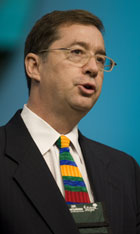United Methodists celebrated the 100th anniversary of the denomination's Social Creed during the last day of their General Conference.
"The Social Creed tradition of The United Methodist Church represents several streams of social concerns embodied today in the General Board of Church and Society," said Jim Winkler, top executive of the board.
The original creed, written in 1908, was a denominational statement decrying child labor and supporting the economic rights of workers, better workplace conditions, better wages and worker safety.
"The 1908 Creed affirmed the mind of Christ as the sure remedy of all social ills," Winkler said.
The denomination's social action agency still advocates for the poor and working people today, he told United Methodists from around the world. The board also remains "passionately" focused on the abuse of alcohol and works for a ban on the advertising of alcohol, maintaining the beer tax and to strengthen laws and regulations on alcohol. The board also advocates for world peace.
Anniversary

Jim Winkler
The 2004 United Methodist General Conference designated the period of 2005-2008 as a time of celebration, education and study of the Social Creed and Social Principles leading up to the 100th anniversary of the 1908 Social Creed.
As part of that celebration, the Board of Church and Society took on the task of writing a contemporary, timeless version to offer for future generations.
A task force from the board worked on a new "poetic" creed that was accepted by the 2008 General Conference as a "companion litany."
Bishop Jane Middleton, chair of the Social Creed task force for the board, said the adopted litany is "a witness of hope for the worldwide United Methodist Church."
The Rev. Grace Cajiuat, also a member of the Social Creed task force, led the delegates in a musical version of the new creed composed by Carol Simpson, a 23-year-old music graduate attending Claremont School of Theology.
The United Methodist Social Creed has been the inspiration for other faith traditions and groups, including the National Council of Churches, to develop their own creeds, according to Bishop Beverly Shamana, president of the board.
"We take seriously the scriptural mandate to care for the sojourner, the weak, the orphaned," Winkler said. "We believe God wants us to work for a better world that it may be on earth as it is in heaven."
*Gilbert is a news writer for United Methodist News Service.
News media contact:Kathy Gilbert,e-mail: newsdesk@umcom.org.
Related Articles
General Conference headlines
Church adopts proposed creed as litany
Resource
Like what you're reading? Support the ministry of UM News! Your support ensures the latest denominational news, dynamic stories and informative articles will continue to connect our global community. Make a tax-deductible donation at ResourceUMC.org/GiveUMCom.




